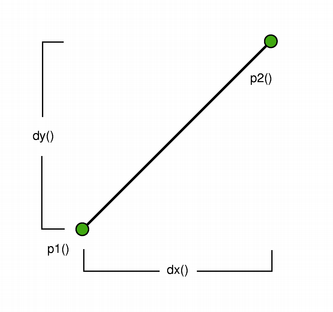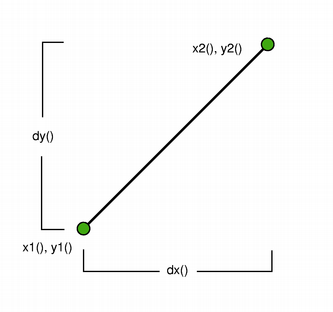QLine Class Reference |
| QLine () | |
| QLine ( const QPoint & p1, const QPoint & p2 ) | |
| QLine ( int x1, int y1, int x2, int y2 ) | |
| QPoint | p1 () const |
| QPoint | p2 () const |
| int | x1 () const |
| int | x2 () const |
| int | y1 () const |
| int | y2 () const |
| int | dx () const |
| int | dy () const |
| bool | isNull () const |
| void | setP1 ( const QPoint & p1 ) |
| void | setP2 ( const QPoint & p2 ) |
| void | setLine ( int x1, int y1, int x2, int y2 ) |
| void | setPoints ( const QPoint & p1, const QPoint & p2 ) |
| void | translate ( const QPoint & offset ) |
| void | translate ( int dx, int dy ) |
| QLine | translated ( const QPoint & offset ) const |
| QLine | translated ( int dx, int dy ) const |
| bool | operator!= ( const QLine & line ) const |
| bool | operator== ( const QLine & line ) const |
Related Non-Members
| QDataStream & | operator<< ( QDataStream & stream, const QLine & line ) |
| QDataStream & | operator>> ( QDataStream & stream, QLine & line ) |
Detailed Description
The QLine class provides a two-dimensional vector using integer precision.
A QLine describes a finite length line (or a line segment) on a two-dimensional surface. The start and end points of the line are specified using integer point accuracy for coordinates. Use the QLineF constructor to retrieve a floating point copy.
 |  |
The positions of the line's start and end points can be retrieved using the p1(), x1(), y1(), p2(), x2(), and y2() functions. The dx() and dy() functions return the horizontal and vertical components of the line. Use isNull() to determine whether the QLine represents a valid line or a null line.
Finally, the line can be translated a given offset using the translate() function.
See also QLineF, QPolygon, and QRect.
Member Function Documentation
QLine::QLine ()
Constructs a null line.
QLine::QLine ( const QPoint & p1, const QPoint & p2 )
Constructs a line object that represents the line between p1 and p2.
QLine::QLine ( int x1, int y1, int x2, int y2 )
Constructs a line object that represents the line between (x1, y1) and (x2, y2).
QPoint QLine::p1 () const
Returns the line's start point.
See also setP1(), x1(), y1(), and p2().
QPoint QLine::p2 () const
Returns the line's end point.
See also setP2(), x2(), y2(), and p1().
int QLine::x1 () const
Returns the x-coordinate of the line's start point.
See also p1().
int QLine::x2 () const
Returns the x-coordinate of the line's end point.
See also p2().
int QLine::y1 () const
Returns the y-coordinate of the line's start point.
See also p1().
int QLine::y2 () const
Returns the y-coordinate of the line's end point.
See also p2().
int QLine::dx () const
Returns the horizontal component of the line's vector.
See also dy().
int QLine::dy () const
Returns the vertical component of the line's vector.
See also dx().
bool QLine::isNull () const
Returns true if the line is not set up with valid start and end point; otherwise returns false.
void QLine::setP1 ( const QPoint & p1 )
Sets the starting point of this line to p1.
This function was introduced in Qt 4.4.
void QLine::setP2 ( const QPoint & p2 )
Sets the end point of this line to p2.
This function was introduced in Qt 4.4.
void QLine::setLine ( int x1, int y1, int x2, int y2 )
Sets this line to the start in x1, y1 and end in x2, y2.
This function was introduced in Qt 4.4.
See also setP1(), setP2(), p1(), and p2().
void QLine::setPoints ( const QPoint & p1, const QPoint & p2 )
Sets the start point of this line to p1 and the end point of this line to p2.
This function was introduced in Qt 4.4.
See also setP1(), setP2(), p1(), and p2().
void QLine::translate ( const QPoint & offset )
Translates this line by the given offset.
void QLine::translate ( int dx, int dy )
This is an overloaded function.
Translates this line the distance specified by dx and dy.
QLine QLine::translated ( const QPoint & offset ) const
Returns this line translated by the given offset.
This function was introduced in Qt 4.4.
QLine QLine::translated ( int dx, int dy ) const
This is an overloaded function.
Returns this line translated the distance specified by dx and dy.
This function was introduced in Qt 4.4.
Returns true if the given line is not the same as this line.
A line is different from another line if any of their start or end points differ, or the internal order of the points is different.
bool QLine::operator== ( const QLine & line ) const
Returns true if the given line is the same as this line.
A line is identical to another line if the start and end points are identical, and the internal order of the points is the same.
Related Non-Members
QDataStream & operator<< ( QDataStream & stream, const QLine & line )
Writes the given line to the given stream and returns a reference to the stream.
See also Format of the QDataStream Operators.
QDataStream & operator>> ( QDataStream & stream, QLine & line )
Reads a line from the given stream into the given line and returns a reference to the stream.
See also Format of the QDataStream Operators.
Best Of
Actualités les plus lues
- 2017 : un quinquennat pour une nouvelle version du C++ ? Possible, selon Herb Sutter 6
- Qt Commercial : Digia organise un webinar gratuit le 27 mars sur la conception d'interfaces utilisateur et d'applications avec le framework 0
- Orientation de l'écran en QML, un article de Christophe Dumez traduit par Thibaut Cuvelier 0
- « Quelque chose ne va vraiment pas avec les développeurs "modernes" », un développeur à "l'ancienne" critique la multiplication des bibliothèques 82
- Apercevoir la troisième dimension ou l'utilisation multithreadée d'OpenGL dans Qt, un article des Qt Quarterly traduit par Guillaume Belz 0
- Les développeurs ignorent-ils trop les failles découvertes dans leur code ? Prenez-vous en compte les remarques des autres ? 17
- BlackBerry 10 : premières images du prochain OS de RIM qui devrait intégrer des widgets et des tuiles inspirées de Windows Phone 0
- Quelles nouveautés de C++11 Visual C++ doit-il rapidement intégrer ? Donnez-nous votre avis 10
- Adieu qmake, bienvenue qbs : Qt Building Suite, un outil déclaratif et extensible pour la compilation de projets Qt 17
- 2017 : un quinquennat pour une nouvelle version du C++ ? Possible, selon Herb Sutter 6

- Linus Torvalds : le "C++ est un langage horrible", en justifiant le choix du C pour le système de gestion de version Git 100
- Comment prendre en compte l'utilisateur dans vos applications ? Pour un développeur, « 90 % des utilisateurs sont des idiots » 229
- Quel est LE livre que tout développeur doit lire absolument ? Celui qui vous a le plus marqué et inspiré 96
- Apple cède et s'engage à payer des droits à Nokia, le conflit des brevets entre les deux firmes s'achève 158
- Nokia porte à nouveau plainte contre Apple pour violation de sept nouveaux brevets 158
- Quel est le code dont vous êtes le plus fier ? Pourquoi l'avez-vous écrit ? Et pourquoi vous a-t-il donné autant de satisfaction ? 83
- Le Draft final de la norme C++ 0X validé 181

Le Qt Quarterly au hasard

Les formes du pluriel dans les traductions
Communauté
Ressources
- 91 cours et tutoriels Qt
- F.A.Q. Qt : 200 questions et réponses
- 48 Qt Quarterly, 35 Qt Labs et 22 Qt DevNet en français
- 43 outils Qt
- 99 sources Qt
- 26 binaires Qt
- 6 livres Qt et 9 critiques
- La documentation de Qt 4.7 en français : 157 classes, 70 concepts et 24 modules
- 3 certifications Qt
Liens utiles
Contact
- Vous souhaitez rejoindre la rédaction ou proposer un tutoriel, une traduction, une question... ? Postez dans le forum Contribuez ou contactez-nous par MP ou par email (voir en bas de page).
Qt dans le magazine
| Cette page est une traduction d'une page de la documentation de Qt, écrite par Nokia Corporation and/or its subsidiary(-ies). Les éventuels problèmes résultant d'une mauvaise traduction ne sont pas imputables à Nokia. | Qt 4.6-snapshot | |
| Copyright © 2012 Developpez LLC. Tous droits réservés Developpez LLC. Aucune reproduction, même partielle, ne peut être faite de ce site et de l'ensemble de son contenu : textes, documents et images sans l'autorisation expresse de Developpez LLC. Sinon, vous encourez selon la loi jusqu'à 3 ans de prison et jusqu'à 300 000 E de dommages et intérêts. Cette page est déposée à la SACD. | ||
| Vous avez déniché une erreur ? Un bug ? Une redirection cassée ? Ou tout autre problème, quel qu'il soit ? Ou bien vous désirez participer à ce projet de traduction ? N'hésitez pas à nous contacter ou par MP ! | ||
Copyright © 2000-2012 - www.developpez.com



















